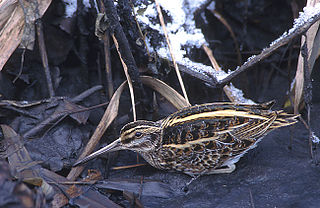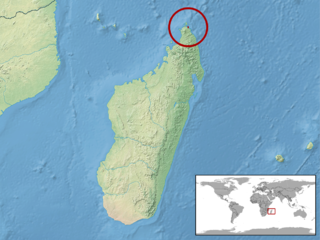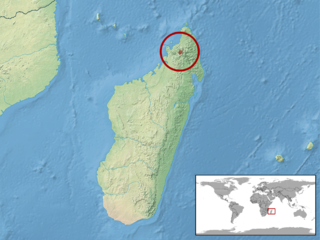
The Gunnison grouse or Gunnison sage-grouse or lesser sage-grouse is a species of grouse endemic to the United States. It is similar to the closely related greater sage-grouse in appearance, but about a third smaller in size, with much thicker plumes behind the head; it also has a less elaborate courtship dance. It is restricted in range to southwestern Colorado and extreme southeastern Utah, with the largest population residing in the Gunnison Basin region in Colorado. Despite being native to a country where the avifauna is relatively well known, it was overlooked until the 1990s due to the similarities with the sage grouse, and only described as a new species in 2000—making it the first new avian species to be described from the USA since the 19th century. The description of C. minimus as a separate species is supported by a molecular study of genetic variation, showing that gene flow between the large-bodied and the small-bodied birds is absent.
Paracontias is a genus of skinks, lizards in the family Scincidae. The genus is endemic to Madagascar.

The jack snipe or jacksnipe is a small stocky wader. It is the smallest snipe, and the only member of the genus Lymnocryptes. Features such as its sternum make it quite distinct from other snipes or woodcocks.

The water opossum, also locally known as the yapok, is a marsupial of the family Didelphidae. It is the only living member of its genus, Chironectes. This semiaquatic creature is found in and near freshwater streams and lakes from Mexico through Central and South America to Argentina and is the most aquatic living marsupial. It is also the only living marsupial in which both sexes have a pouch. The thylacine, commonly referred to as the Tasmanian tiger, also exhibited this trait, but it is now believed to be extinct.

The long-tongued nectar bat, also known as the northern blossom bat, honey nectar bat, least blossom-bat, dagger-toothed long-nosed fruit bat, and lesser long-tongued fruit bat, is a species of megabat. M. minimus is one of the smallest species in the family Pteropodidae, with an average length of 60–85 mm. It has a reddish-brown colouring with relatively long hair compared to the other species. The hair on the abdomen is a lighter colour, and a dark brown stripe runs bilaterally down the top of the head and back.

The swamp antechinus, also known as the little Tasmanian marsupial mouse, is a species of shrew-like marsupial of the family Dasyuridae and as such is related to dunnarts, quolls and the Tasmanian devil.

The long-tongued fruit bat is a species of megabat. It is nectarivorous, feeding on nectar from primarily banana flowers. It is found in several countries in South and Southeast Asia.

The East African epauletted fruit bat is a species of megabat in the family Pteropodidae. It is found in Ethiopia, Kenya, Somalia, Tanzania, and Uganda. Its natural habitats are dry savanna and rocky areas. It is threatened by habitat loss.

Paracontias brocchii, also known commonly as the stone skink, is a species of lizard in the family Scincidae. The species is endemic to Madagascar.

Paracontias fasika is a species of skinks. It is endemic to Madagascar.

Paracontias hafa is a species of skinks. It is endemic to Madagascar.

Hildebrand's skink is a species of skinks. It is endemic to Madagascar.

The Anzahamaru skink is a species of skinks. It is endemic to Madagascar.

Paracontias kankana is a species of skinks. It is endemic to Madagascar.

Paracontias manify is a species of skinks. It is endemic to Madagascar.
The nosy Mamoko skink is a species of skinks. It is endemic to Madagascar.

Rothschild's skink is a species of skinks. It is endemic to Madagascar.

Paracontias tsararano is a species of skinks. It is endemic to Madagascar.

Paracontias vermisaurus is a species of skinks. It is endemic to Madagascar.


















